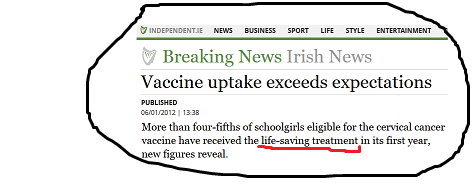






 |
||
|
Survey of parental attitudes in the North-West towards the HPV Vaccine Follow @REGRET_ie
Our names are Tara Dolan and Chloe Kilkenny and we are Transition Year students in Magh Ene College, Bundoran, Co. Donegal. As part of our BT Young Scientist project, we carried out a survey of parental attitudes in the North-West towards the HPV Vaccine. We distributed surveys to parents of female children in 5thand 6th class in primary schools and in second level schools across counties Sligo, Leitrim, Donegal and Galway. In total, we collected 181 surveys. Our results indicated that 92.3% of the respondents were aware of the HPV vaccine females receive in secondary school. 37.6% of the participants in the survey had a daughter who had already received the vaccine and 60.8% did not have a daughter who had been vaccinated as yet. Of the respondents who had a daughter who had already received the vaccine, 63.8% reported a positive experience compared to 36.2% who stated a negative experience. Thus, more than a third of the parents who had a daughter who had already received the vaccine reported a negative reaction. We find this to be a very worrying statistic. The results of question 4 show that 42% of the respondents would not wish to have any other younger daughters vaccinated with the HPV vaccine, this is almost double the number who said that they would, which stood at 21.5%. 30.4% of respondents indicated that they would need more information regarding the vaccine to make a decision. We believe that this shows that there is a lot of uncertainty among the general public regarding this vaccine. This is backed up by the fact that almost two-thirds of the participants in the survey (65.7%) indicated that they believe that the information leaflet on the vaccine provided by the HSE, does not provide enough information to parents.With regard to the prevention of cervical cancer. 18.2% felt that smear tests should be the top priority followed by education (11.6%) and condom usage (9.4%). In fact, the vaccine programme was the least favoured strategy in preventing HPV, with only 6.6% of the respondents citing it as the top priority in the prevention of cervical cancer. The results of our survey showed that many of the parents who completed the survey favoured the lowering of the age for smear exams. Finally, the results of our survey indicate that 45.9% of parents believe that the HSE should not continue this vaccination programme. The findings of our survey indicate the levels of concern that exist among parents of young girls about taking this vaccine. We believe that it is essential that these concerns and the negative effects reported by parents in our survey be properly addressed by the HSE. We would like to see greater consultation with parents before the administration of this vaccine to young girls. See also this report from Journal.ie . |
||
|
 |
|||||||||||
Home | Background | Victims | Research | Videos